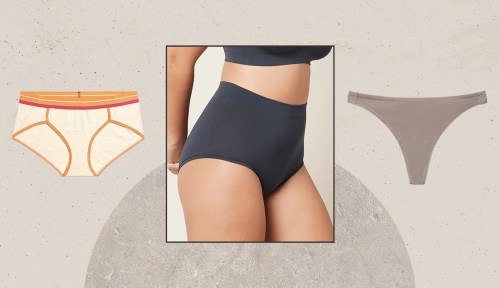Our editors independently select these products. Making a purchase through our links may earn Well+Good a commission
There’s a lot of personalized vitamin companies out there—here’s how they compare
Find yourself wondering, "what vitamins should i take?" Supplement companies are attempting to answer it with personalized recs.

As a kid, the only vitamin dilemma you had to worry about was whether you were in the mood for an orange-flavored Wilma or a cherry-flavored Fred. As an adult, supplement queries are a lot more complicated. The logic of everyone—regardless of their eating habits and lifestyles—taking the same multivitamin every day is about as outdated as the Flintstones themselves. In the past few years, in-the-know wellness insiders have increasingly turned to personalized vitamin companies (which will send you packets of supplements based on your individual lifestyle, diet, and goals) as an insurance policy for their nutrient needs.
But there’s not only the question what to take, but also who to trust: Unlike food, the supplement industry is widely unregulated—and that includes these “trendy” new companies. And with many of them charging per pill, it pays (literally) to do your homework before signing up for a subscription.
Included here are the general guidelines to consider before you start shopping around and how some of the most popular vitamin subscription companies compare to each other based on price, what they offer, and commitment requirements. Keep reading for everything you need to know.
General guidelines to consider
Since vitamins are something you’re likely going to be putting into your body every day, The Vitamin Solution author Arielle Levitan, MD (who, full disclosure, is the founder of Vous Vitamins), says it’s really important to look into where the company sources its ingredients—and to make sure it tests them for toxicity. If you aren’t truly getting what’s advertised, you could be wasting your money, or worse, negatively impacting your health.
“First, look to see who is behind these companies and if there are respected doctors associated,” Dr. Levitan says. “When it comes to supplements, you really want to get them from companies that have medically trained doctors behind them and not naturopathic doctors, who are helpful in other ways, but not when it comes to medicine.” Dr. Levitan also says to look for certification seals, which indicate that the ingredients have been tested for authenticity and toxicity; she specifically calls out the USP Verified Mark and Good Manufacturing Practices seals.
Virtually every personalized vitamin company starts the same way: with a quiz that consumers take. Dr. Levitan confirms this is, for the most part, a valid way to figure out what vitamins are worth adding to your regimen (unless you have a chronic health condition or other illness, in which case she says it’s important to work closely with an MD and not rely on a quiz). “What I’ve realized as a doctor is that nine times out of 10, I can predict what nutrients someone isn’t getting enough of based on their diet and lifestyle,” she says.
Still, Probiotics.com medical advisor and pharmacist James LaValle, RPh (who is unaffiliated with any supplement companies), says there are some deficiencies quizzes can’t pick up on, such as vitamin B12. “Just because you have a deficiency symptom doesn’t mean you are deficient in that nutrient, and it also doesn’t evaluate why you are deficient in it,” he says. “In other words, just taking the nutrient isn’t always the best way to resolve the problem.” So if you’re feeling particularly run-down or “off,” definitely see a doctor.
One red flag for LaValle is if a personalized vitamin company’s quiz is super short; this could signal it’s more a marketing ploy than a way to actually learn about someone’s health needs. He also adds that the questions on the quiz should be specific; for example, he says thin, spoon-shaped nails can be a sign of iron deficiency. So don’t be weirded out if the quiz is asking you some seemingly odd questions—there’s a reason for them.
Dr. Levitan says to be wary of personalized vitamin companies that charge by the pill and seem to be recommending you swallow a whole pharmacy every day. “Some nutrients are actually not good to get in supplement form at all, such as calcium, which doctors have realized that most women actually do get enough of, through dairy and dairy alternatives,” she says, adding that getting too much calcium could cause kidney stones and, in some cases, has been linked to cancer. “Vitamin A is another nutrient most people get enough of,” Dr. Levitan says.
Last, Dr. Levitan emphasizes that supplements should really just be a backup plan; ideally you want to get your vitamins through food and they are just there to fill in the gaps when you don’t. LaValle echoes Dr. Levitan’s warning, name-checking zinc as a nutrient to keep an eye on because high doses should not be taken for longer than three months.
With all this in mind, let’s see how the top companies compare, shall we?
Baze
How it works: Baze goes beyond the quiz-click-buy route most personalized vitamin companies use, relying on a blood sample instead, which is collected via a device developed by MIT scientists and then analyzed in a lab. Subscribers mail in the blood sample, fill out an online quiz (there it is!), and wait to see which of 10 vitamins they should add to their routine. (The company also may recommend one or more of five other add-ons, including turmeric, l-theanine, and ashwagandha.) Subscribers can also track their results via the Baze app to see if what they’re taking is actually making a difference.
Price: $129 for the testing kit; $99 per month for the subscription.
How it gets to you: Vitamin packs are packaged by what you should take each day and mailed monthly, straight to a subscriber’s home.
How to opt out: Subscribers who want to cancel are prompted to email [email protected] to end their subscription.
Care/of
How it works: Subscribers can take a Care/of generated quiz (created using AI-powered technology and knowledge from scientists and nutritionists), which will recommend what their vitamin packs should include or they can piece together their own packs, based on what they know they want them to have (hopefully after consulting with their doctor). Care/of has an extensive list of options, including a prenatal vitamin, vegan vitamin D and omega supplements, and probiotics. The company also sells powder blends (for your smoothie) and powder boosters formulated to serve different needs, such as immunity or better sleep.
Price: Subscribers are charged by the supplement, which range in price from $5 to $25 a month.
How it gets to you: Vitamin packs are packaged by what you should take each day and mailed monthly, straight to a subscriber’s home.
How to opt out: Stopping your subscription is straight-forward: Subscribers just have to log on to their account online, go to to the account settings, and request to pause or cancel their subscription.
Persona
How it works: Subscribers start by taking a quiz. The company offers a whopping 84 different supplement options, including vegan vitamins. Some of the more unexpected ones: CBD hemp extract, green tea extract, menopause support, and spirulina. They also offer probiotic and prenatal vitamins. At any time—from the start of taking the quiz to after starting a subscription—you have access to Persona’s team of nutritionists, who can answer any questions you may have. The company also has a give-back initiative, partnering with Vitamin Angels, a non-profit that helps fight malnutrition.
Price: Subscribers are charged by the pill, which range in price between $0.06 and $2.49 per day.
How it gets to you: Vitamins are mailed to subscribers monthly, given what they should take daily for 28 days.
How to opt out: Subscribers can opt out by logging into their account and selecting “turn off autoship.”
Ritual
How it works: Instead of a quiz, Ritual has three different multivitamin options for women to choose from: one for premenopausal women, one for postmenopausal women, and a prenatal vitamin. The primary women’s multivitamin is made with nine (vegan) essential nutrients; it’s the basics without the buzzy extras some other companies promote, such as ashwagandha. The one for postmenopausal women contains eight essential nutrients, all of which are vegan and soy-free.
Price: The multivitamin for premenopausal women is $30 a month, while the other two are $35 a month.
How it gets to you: Subscribers get a new bottle of multivitamins mailed to them monthly.
How to opt out: Like most of the others, ending a Ritual subscription is easy; subscribers just have to click “change/cancel membership” in their account settings after logging in.
Rootine
How it works: Like most personalized vitamin companies, Rootine starts with a quiz—but unlike most others, it doesn’t end there. Subscribers also do an at-home blood test and a DNA test, swabbing the inside of their cheek and mailing it in to be analyzed in a lab. Then, a few weeks later, they get their recommendations based on the results of the quiz, blood test, and DNA sample. The vitamins themselves are different than other companies’, too. Instead of traditional pills, they are time-released beads and can be mixed into smoothies or food if you don’t want to just knock them back. The reasoning, according to the company, is to mimic the absorption of real food.
Price: The initial testing and report is $98 (which includes the first month of vitamins). After the first month, the subscription is $60 a month, regardless of what’s in a person’s vitamin pack.
How it gets to you: Subscribers get their vitamin blends mailed to them every 90 days and they come in little daily packets.
How to opt out: Subscribers can end their subscription by emailing the company at [email protected], but must cancel 30 days prior to the end of your current three month subscription.
Vitafive
How it works: If you hate pills, Vitafive might be for you—everything they offer comes in gummy form. Subscribers can build their own packs or choose an already put-together one based on their biggest need: energy, sleep, fitness, diet, complexion, digestion, immunity, bone strength, and heart health.
Price: The unpersonalized monthly packs range are between $20 and $24 while the personalized packs are priced by the pill, ranging from $7.99 to $12.99 a month.
How it gets to you: After you choose what you want in your personalized pack, Vitafive parcels them out into daily packets, which are mailed to subscribers monthly.
How to opt out: Subscribers who want to pause or cancel their subscription are advised to call the company directly.
Vous Vitamin
How it works: Subscribers are given recs based on the results of a (drumroll) quiz. A multivitamin—advised to take twice, daily—is created fitting each subscriber’s needs.
Price: The more of a commitment you make, the better deal you get: It’s $27.49 a month when you commit to six months, $31.65 when committing to three, and $39.99 for a one-month trial.
How it gets to you: The personalized multivitamins are mailed to subscribers monthly.
How to opt out: Subscribers can end their subscription at any time by logging into their account and indicating that they want to do so under their account settings.
These are the 6 supplements doctors recommend most often. Plus, what time of day you should be taking them.
Sign up for the Well+Good SHOP Newsletter
Get exclusive deals on wellness, beauty, fitness, and food products that have been hand-picked by our editors.
Got it, you've been added to our email list.









